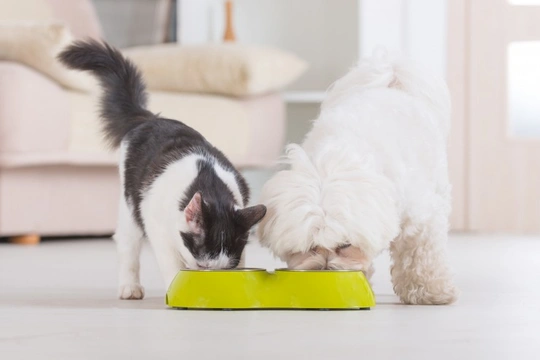
Can Dogs Eat Cat Food Long-term?
If you share a home with a dog and a cat, the chances are that on the odd occasion you run out of dog food and give them a can of cat food instead. If the truth be known it would do them no harm to have a little taste of cat food on the odd occasion. However, a dog's nutritional needs are a lot different to that of their feline counterparts which means if fed cat food over a long period of time they can develop certain avoidable heath issues. Cat food is specifically formulated for cats and therefore does not contain all the nutrients a dog needs to remain healthy. However, as any pet owner knows if given the chance our lovely canine companions like nothing more than to steal a cat's food which is why many people tend to put their food bowls on a work surface rather than on the ground where their pooch can get at them.
A dog's protein needs are different to that of a cat
Cats actually need higher levels of protein in their diets and the reason for this is they are “obligate carnivores” which means they need to eat meat which is animal-sourced. Dogs, however are omnivores and can be fed proteins which are both animal-sourced and other. As such our canine companions do not need to eat as much protein to remain strong and healthy. Commercially produced dog food has to contain a minimum level of protein which is set at 18% which meets their basic needs. Commercial cat food, on the other hand must contain a higher level of meat-sourced protein which is typically around 26% which is considerably higher than that for dogs.
Cats need higher amounts of fat in their diets
Cats need higher levels of fat in their diet which translated means they need to eat food that boasts more calories which is around double the amount their canine counterparts need. This may not sound a lot, but over a time the higher levels of protein and fat in cat food, when fed to dogs, will take a toll on their health and their weight. In short, cat food is much too rich for dogs and could over time lead to them becoming obese.
A dog's digestive system is not designed to digest lots of fatty rich foods which means when they eat too much, they often suffer from digestive issues which could lead to vomiting and bad cases of diarrhoea which in turn leads to them becoming dehydrated which can negatively impact their kidney function.
The difference in vitamin and mineral needs in dogs and cats
Cat food contains different levels of vitamins and minerals than that of dog food because their needs are very different. This can lead to excesses in certain levels and deficiencies in others. Dogs need more zinc and Vitamin E in their diet which means they don't get enough of both when fed cat food. Cat food also contains taurine which dogs don't actually need to remain healthy.
Dogs need more carbohydrates in their diet
Our canine companions need more carbohydrates in their diet and cat food just does not contain enough which means a dog would not get all the “energy” they need on a daily basis. Carbohydrates can make up to 50% of dog food which provides them with all the energy then need. Cats get it from the fat content found in their food.
The dangers associated with feeding cat food to dogs on a long-term basis
Cats need to be fed a high protein diet which may be okay to feed to puppies when they are still growing and very active adult dogs, but for older or unhealthy dogs, it can present a lot of problems. Firstly, they would have a really hard time digesting their food which in turn puts a lot of stress on their systems. Dogs that suffer any sort of kidney disease should not be fed high-protein food because it will negatively impact their kidney function making their condition that much worse. Any breed of dog that's prone to suffering from diabetes should not be fed a high-protein diet either.
Conclusion
There are times when you may have to give your dog a can of cat food because you've run out of their usual food. However, this should only be an occasional thing because if you feed cat food to a dog long-term, it could lead to all sorts of health issues. It could result in a dog developing quite serious digestive problems. A dog's nutritional needs are very different to that of cats with the latter being far too rich and fatty for dogs to be able to cope with. If you share your home with a cat and a dog, it's best to feed your feline friend where your pooch can't steal their food whether it's on a work surface or in a different room where your dog is not allowed to go to avoid any digestive and other health issues from developing.



